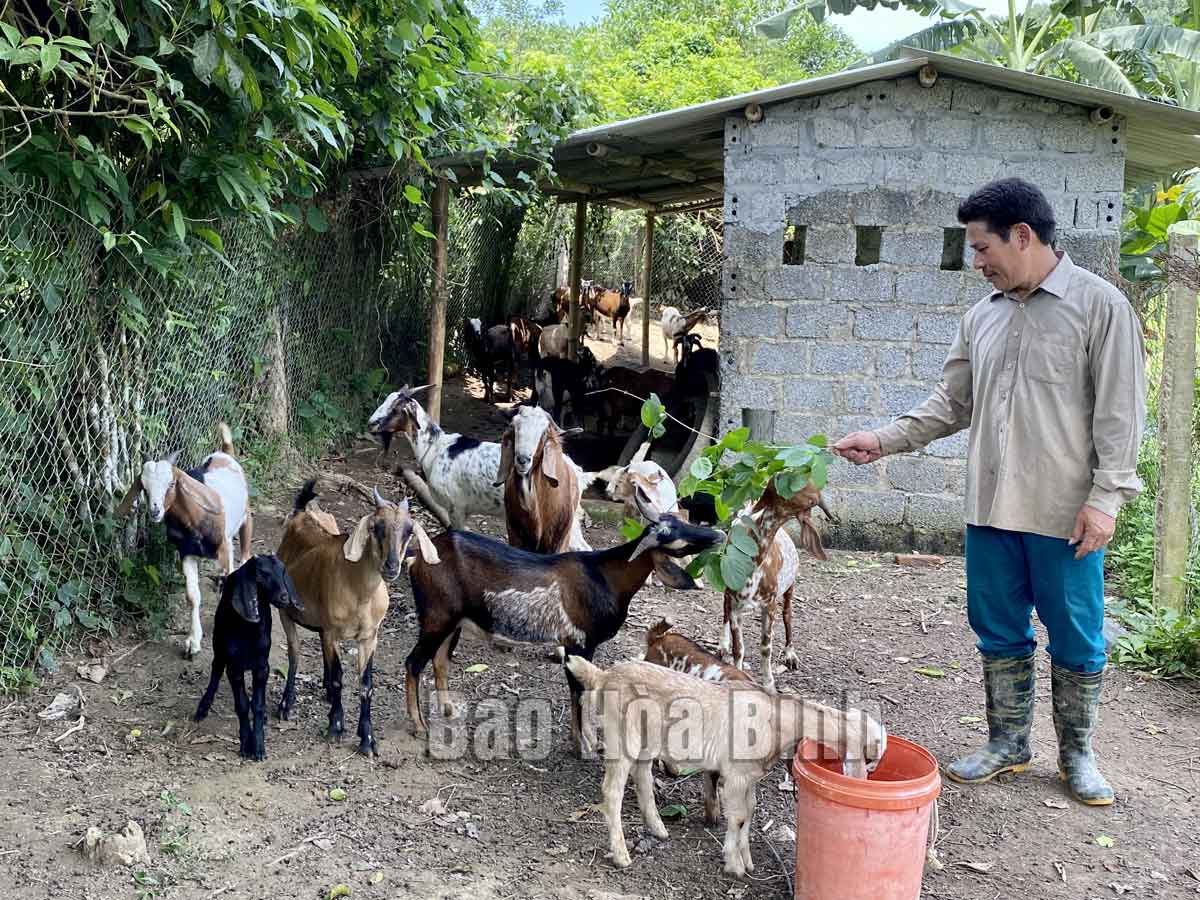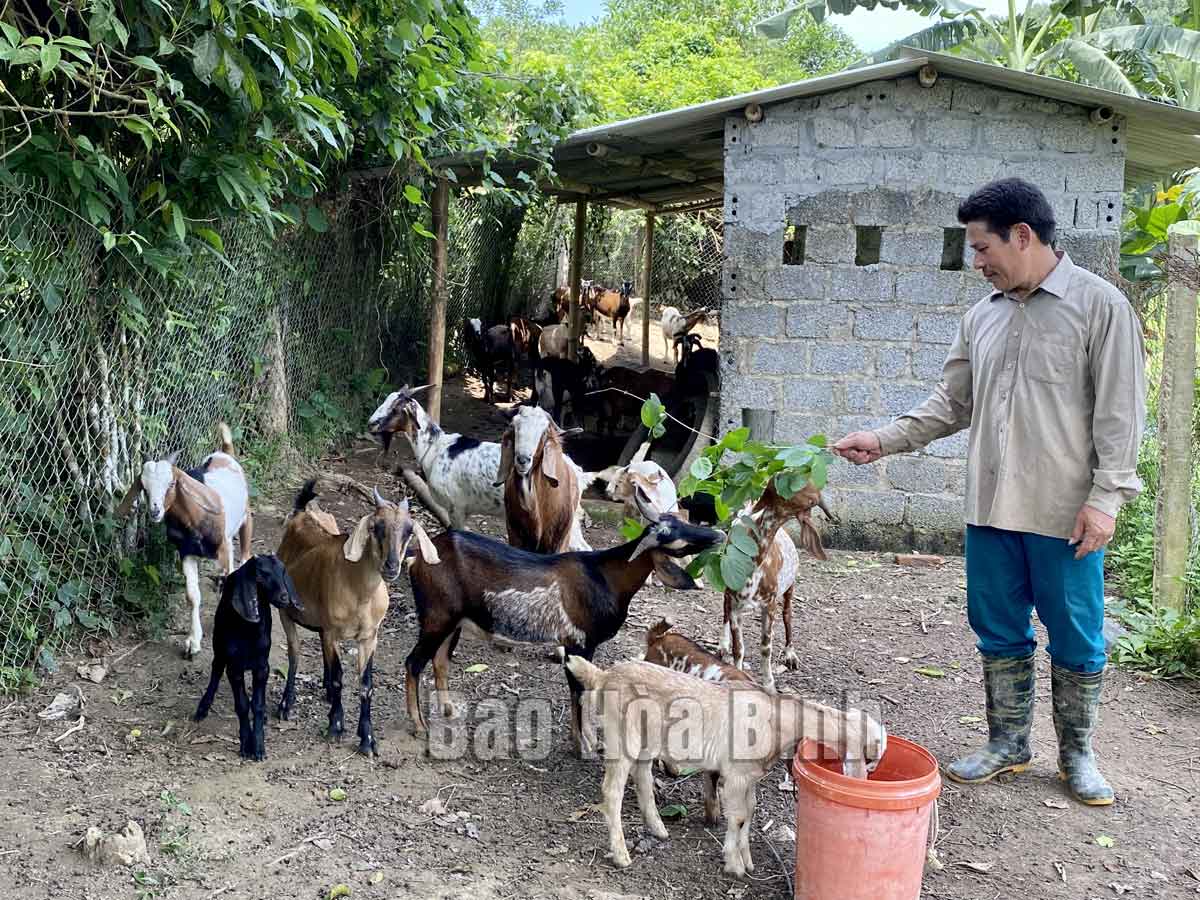
(HBO) - Thanks to the access to loans from the Bank for Social Policies, Pham Thi Sinh, a member of the women’s union in Tan Lam village, Phu Thanh commune (Lac Thuy), has become well-off more than two years after starting a business of raising goats for breeding and meat.

The model of raising goats for breeding and meat of
farmers in Vo village, Thong Nhat commune (Lac Thuy) has a stable market,
creating sustainable livelihoods.
Sinh shared, "In the past, I and my husband used to work as
hired labourers to make a living. Then we got the attention of the Women’s
Union and were sent to a class on transferring scientific and technical
advances and provided with a 50-million VND loan, I took the courage to start a
new direction of animal husbandry. In 2020, my family's goat herd has only 20
heads, but now the figure has multiplied to more than 100. The model brings us
an average annual income of about 200 million VND.”
Not only working hard and being eager to do business, Sinh
also actively supports other member households in connecting and promoting the
sale of livestock products in the market.
Previously, Thong Nhat, An Binh, Hung Thi, Phu Nghia, Khoan
Du and Yen Bong communes faced many difficulties in socio-economic development.
In order to promote sustainable poverty reduction for these communes, Party
committees from the district to commune level have synchronously implemented
solutions and sought programmes and projects integrated with the national
target programme on poverty reduction. Typically, three poverty reduction
models have been built in An Binh, Khoan Du and Hung Thi communes, thus
contributing to creating jobs for 120 rural workers. Associations and mass
organisations of farmers, women and youth have also actively participated in
carrying out many programmes and activities to support members in plant
varieties and access to credit, as well as opening courses on training, guiding
techniques for the care and disease prevention for plants and animals.
Dinh Thi Thu Huyen, head of the district’s Department of
Labour, Invalids and Social Affairs said that once a locality with a relatively
high poverty rate (18.5 percent in 2015), the district has made a breakthrough,
rising to the top group in terms of achieving new-style rural building criteria
of the province.
This outstanding result has contributed importantly to
poverty reduction efforts. The Party Committee, authorities and people of the
district reduced the poverty rate in 2021 to 3.43 percent, and achieved an
average per capita income of 61.2 million VND. /.
According to data from the Hoa Binh Provincial Party Committee, the industrial production index for the first six months of 2025 is estimated to have increased by 20% compared to the same period last year. This marks the highest year-on-year growth rate for this period since 2020.
In the first six months of 2025, Hoa Binh province’s export turnover was estimated at 1.145 billion USD, marking an 18.11% increase compared to the same period in 2024. Import turnover was estimated at $ 804 million, a 17.15% increase, which helped the province maintain a positive trade balance.
The lives of the ethnic minority farmers in Tan Lac district have gradually improved thanks to the new directions in agricultural production. This is a testament to the collective strength fostered through the professional associations and groups implemented by various levels of the district’s Farmers’ Union.
With the motto the "product quality comes first,” after nearly one year of establishment and operation, Muong village’s Clean Food Agricultural and Commercial Cooperative, located in Cau Hamlet, Hung Son Commune (Kim Boi district), has launched reputable, high-quality agricultural products to the market that are well-received by consumers. The products such as Muong village’s pork sausage, salt-cured chicken, and salt-cured pork hocks have gradually carved out a place in the market and they are on the path to obtaining the OCOP certification.
In the past, the phrase "bumper harvest, rock-bottom prices" was a familiar refrain for Vietnamese farmers engaged in fragmented, small-scale agriculture. But today, a new spirit is emerging across rural areas of Hoa Binh province - one of collaboration, organisation, and collective economic models that provide a stable foundation for production.
Maintaining growing area codes and packing facility codes in accordance with regulations is a mandatory requirement for agricultural products to be eligible for export. Recently, the Department of Agriculture and Environment of Hoa Binh province has intensified technical supervision of designated farming areas and packing facilities to safeguard the "green passport" that enables its products to access international markets.



